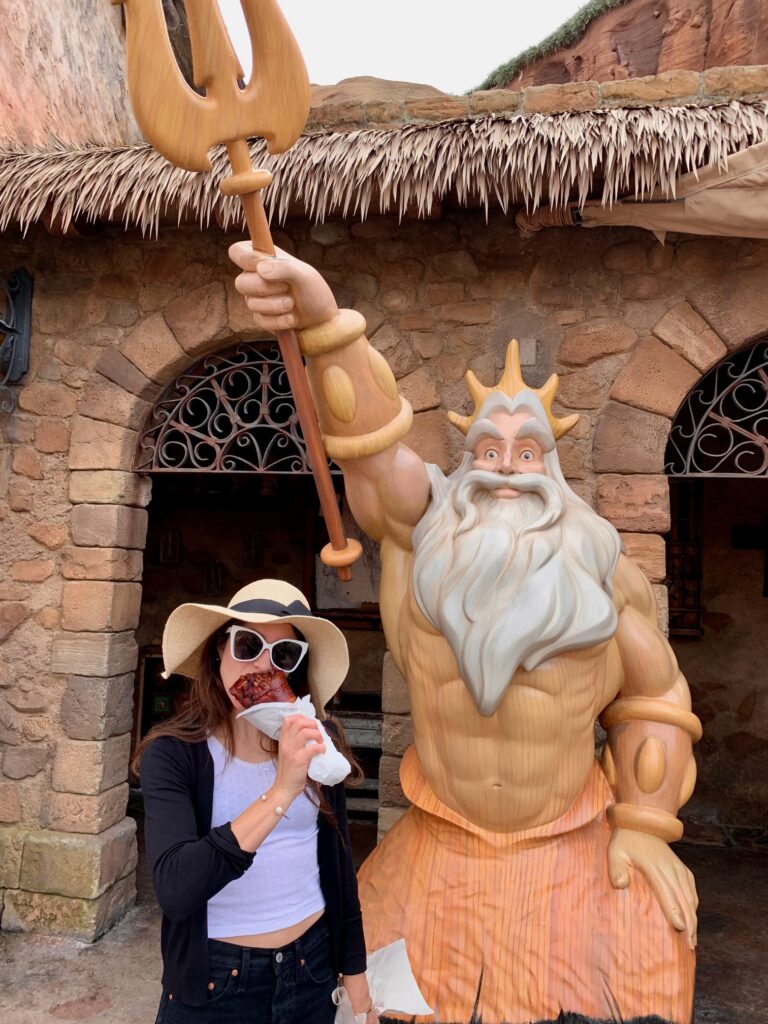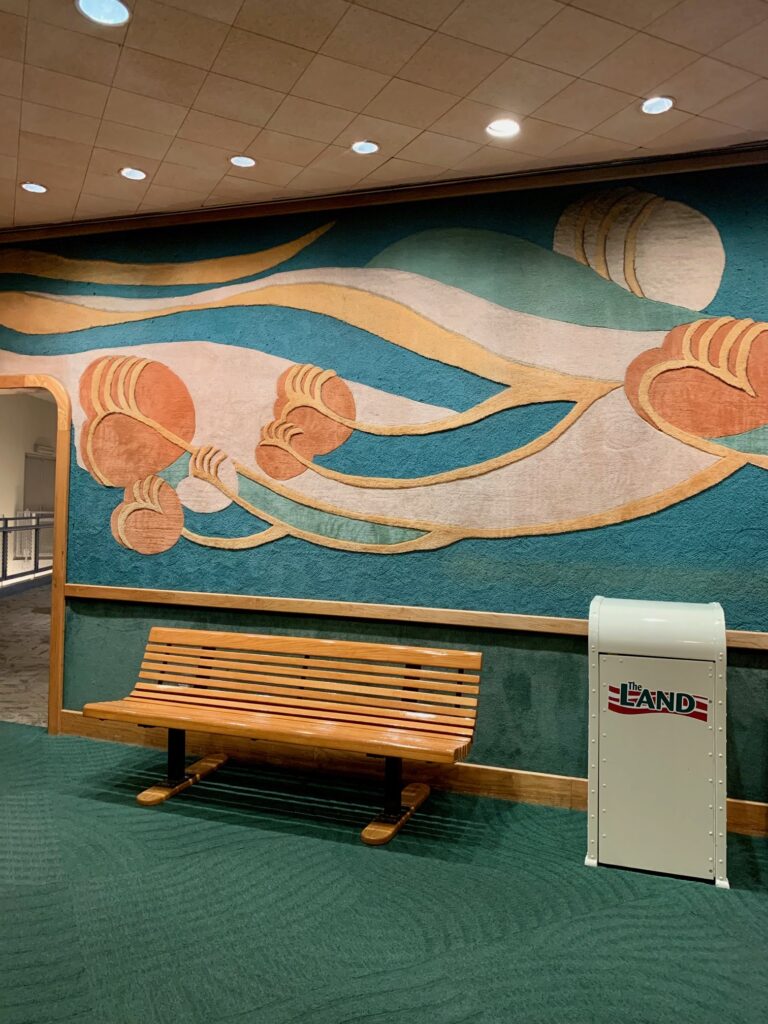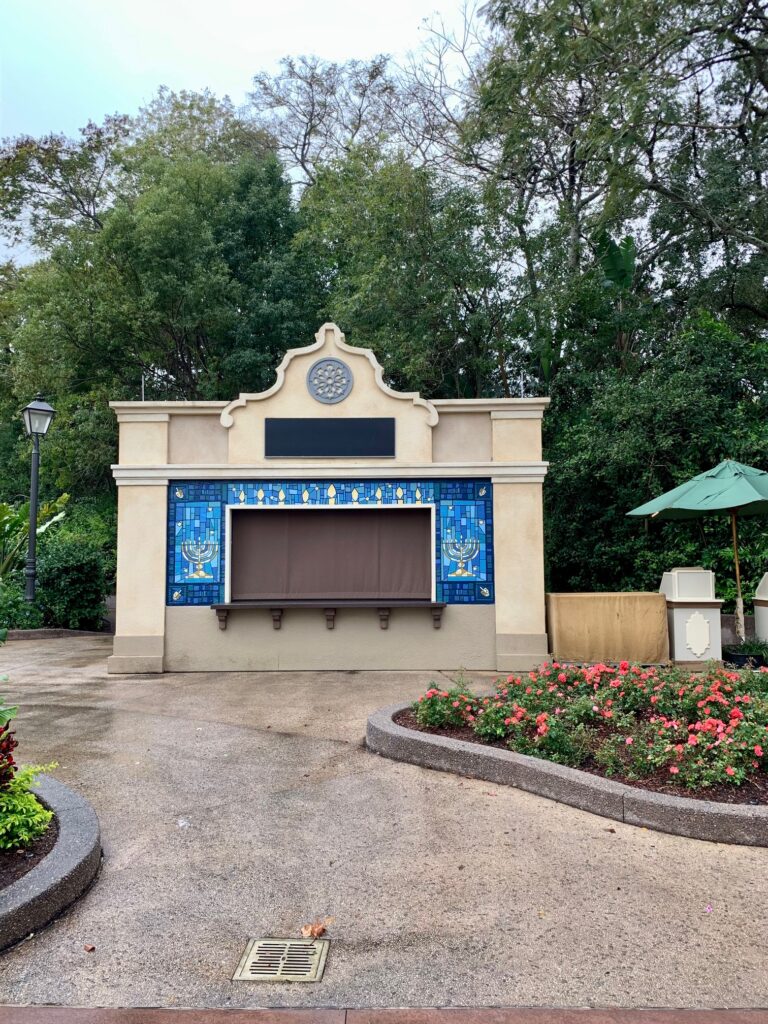
Turkey leg and sea king.
On the first day, God said, “Let the atmospheric water vapors condense and become rain,” and so there was a downpour, and it was inconvenient. But we had ponchos. It was November at Disney World, and ponchos were like noses or smartphones in that every visitor had one, of course they did, it wasn’t even a question.
Soon the rain turned horizontal and worked itself inside the ponchos, and now the condensation cycle in the sky was being restaged on an individual level. You’d think this situation—thousands of humans being dumpling-steamed in plastic and packed into a slow boat or a shuttle simulator—would create a terrible odor, but Disney World was one step ahead: employees (“cast members”) stationed at the threshold of each attraction kindly asked guests to remove their ponchos before entering, and all obeyed, crumpling wet balls into pockets and backpacks … and we saw that it was good.
I’d intended to keep a detailed diary at Disney World but totally failed. My notebook has only two notes, both scribbled at Living with the Land, the EPCOT ride where you hop into a boat and glide past an idyllic farmhouse and through a series of greenhouses to learn about crop rotation and pesticide reduction. “In our search for more efficient ways to grow food, we often fail to realize the impact of our methods,” a narrator explained, channeling Wendell Berry. When we passed a thicket of tomatoes, the narrator revealed that one of EPCOT’s tomato plants had yielded “thirty-two thousand fruits.” A gasp went through the crowd.
As it turned out, Living with the Land features the greatest fantasy in all of Disney World: no dirt. So the first note in my notebook was:
“What vacuum cleaner used by maintenance employees @ Land?”
… for which I neither got nor sought an answer. The second note was:
“Bougainvillea flower edible?”
This was prompted by a sign in one of the greenhouses claiming that it was. Bougainvillea doesn’t look edible. It is too torridly colorful, like one of those frogs whose neon exterior betokens a venomous interior. Later I looked it up and the sign was semicorrect. It is the bract of the bougainvillea that is edible, not the flower, but the bract is what most people think of when they think “bougainvillea flower.” You can deep-fry it in the manner of a zucchini blossom.
I was at Disney World to spend time with fifteen family members who had traveled from the Florida Keys, Maryland, and various parts of Virginia. It was my first time on a Disney property and I’d spent the plane trip reading a folder of articles on Disney. First Baudrillard, to kick off my transition into a figurante interactif. (I skirted Louis Marin’s “Dégénérescence utopique: Disneyland” because it is about Disneyland, not World. And because it is in French.) Then the classic Greil Marcus piece from 1998 about how all mainstream Disney World discourse converges into “a search for a way to say ‘The horror, the horror,’ without sounding too corny”—which was true up until Greil Marcus published the piece. In its wake there emerged an antiphonal category of writing that you could characterize as the “Actually, Disney World is kinda cool!” piece. The best of these include John Jeremiah Sullivan’s 2011 yarn in which the author becomes porous to the park’s majesty through strategically administered doses of weed, and Ron Suskind’s 2014 account of the park (and of Disneyana at large) as a conduit for communication with his autistic son.
There’s also a great deal of academic literature on Disney World. This is true even if you’re someone, like me, who feels that there is a great deal of academic literature on almost everything. Type “Disney World” into JSTOR and you will unearth many pages about how the theme park is not a Rabelaisian carnival (glad that’s been cleared up), or about how it is a monument to death, or about how it is somehow in dialogue with synthetic Cubism or Mecca or Hegel’s end of history. Plus much discussion of simulacra and fascism, naturally.

Random act of Ayn Rand.
What was the point in adding to this surplus? No point. Except, after I’d settled in to our time-share and signed up for the Disney Experience app and started visiting the parks, several puzzles for which there had been no solutions in Greil Marcus or in “Walt Disney World: Bounded Ritual Space and the Playful Pilgrimage Center” et cetera did present themselves.
The puzzles were four in number.
***
Puzzle number one: Walls without a face.
None of the bathrooms (that I saw) at Disney World had mirrors mounted above the sinks. The inevitability of a mirror above a bathroom sink isn’t something you register until you look up and find one missing. Which is exactly what Disney visitors did, by the way, as we washed our hands: looked up, became confused, and then stared at the wall where our faces should have been.
There were mirrors in the bathrooms, but only beside the exits. Clearly this was one of the park’s ingenious interventions. Anyone who might have lingered with their reflection, thereby blocking sink traffic, was forced to move along toward the door. So the location of the mirrors was not a puzzle; the puzzle was this: why had Disney—which is packed with (and even defined by) instances of invisibly elegant people-engineering—fumbled this one by rendering it so noticeable?
Puzzle number two: Lack of sex.
Even though it is a childhood-themed destination, Disney World is also a place where adults wear costumes, drink a ton of alcohol, and walk around in steamy weather—but unlike other locations where these factors obtain, Disney World is utterly sexless. It’s possible I missed the presence of sex, but I looked really hard.
Another observation, perhaps related, was an extraordinary scene that unfolded at one of the French eateries at EPCOT. There, I watched an adult purchase a Grand Marnier Orange Slush, take a sip, frown, and return the drink with a complaint that it was too strong, asking for a redo with a “regular amount of vodka” in it. Has any boozer in history requested a weaker drink? As the former New Jersey senator Robert G. Torricelli said under completely different circumstances: “If you live long enough, you’ll experience everything.”
Puzzle number three: Decency under duress.
Near Soarin’ Around the World, a hang-gliding flight simulator, I stood beside a young mother with two children attached to her body and a third screaming at thrash-metal volume while careening up and down a crowded staircase, knocking into dozens of visitors at full speed. Not only did the casualties abide the shrieking boy with smiles but so did his mother, who plodded after him in unruffled serenity. If you mapped her face on to one of those Paul Ekman affect charts, you’d see an expression of contentment at worst.
In the grab-and-go cafeteria I watched a Disney employee spill a full carton of milk on a grandmother’s pants by accident—and the grandmother laughed! Every time a downpour lashed the park, people hustled into their ponchos with enthusiasm. (Not resentment. Enthusiasm.) Nobody was bummed out by the long lines. The opposite was true, actually; the length of a line seemed to correlate positively with the exuberance of its constituents. “Look at this insanely long line that we are all in! It is so relentlessly long, and yet we are in it!”
Everywhere at Disney World there existed a strong sense of rising to the occasion. The grandmother in her milk-drenched slacks, the mother pursuing her demon spawn, the hour-long lines for ten-minute rides. Rising to an occasion is something we associate with scenarios of adversity, like a post-hurricane cleanup, not scenarios in which we have paid hundreds of dollars to have our pants ruined. And yet.

(Diana Vreeland voice:) Why don’t you … BUILD A MURAL OUT OF CARPET?
Puzzle number four: My lumbago isn’t acting up.
Walt Disney’s Carousel of Progress is often described as a revolutionary theatrical experience, which is true: the theater rotates! The show’s premise mimics the Buster Keaton movie Three Ages, in which Keaton plays a man enduring the tragicomedy of courtship across prehistory, Rome, and the twenties. The point of the film is that heterosexual courtship remains consistent over time. The point of the Disney show is that American families remain consistent(ly wholesome) over time. It is not as funny as Three Ages.
During the show’s first act, an animatronic man delivers the line “My lumbago isn’t acting up.” Isn’t acting up. The inclusion of the word isn’t is, I think, the punctum of the attraction, maybe of the whole park. It is a line that makes perfect sense in the context of the script, but if someone offered you or me a billion dollars to work that sentence into a theme park (or a novel or a poem), and to do so artfully and legitimately, I doubt either of us would succeed in cashing the check.

Israel is closed.
***
As many have observed, the allure of Disney World is that everyone gets to be a child again. This applies to obvious treats, like ice cream and cartoon characters, but also to elements of childhood we remember less fondly. For example, being confused. (See above.) Or being supervised. At Disney World, someone is always supervising you. You are instructed on how and when to stand in line at the happiest ATM on Earth; how and when to board an attraction, how and when to disembark. If you wander into a restaurant where you lack a reservation, you will be cheerfully asked to leave. It’s unsettling to discover how peaceful you feel in an atmosphere of rigid top-down control; how much easier it is to outsource your will to an authority rather than struggle toward self-command. “But only for a few days,” you reassure yourself. “After a few days, it would definitely start to bother me.”
The Orlando airport is Disneyfied too, but in a partial way that Walt would have hated. A retro-looking shuttle zips passengers from the gates to the arrival and departure zones, and although this could be read as an intentional “moment”—a way for visitors to relive the famous monorails of Walt Disney World—it is merely an answer to the conundrum of how to process forty million passengers per year through an airport that can’t handle the volume. The original airfield sprang up in the forties and now possesses the floppy proportions of a suit that has been repeatedly let out to accommodate a fleshier body. Points of architectural pride, like plant-filled atria and sculptural ceilings, are rudely abutted by ad hoc corridors and overflow spaces.
At Orlando’s MCO, as at every airport, people subdue the territory to their needs. If a teenager requires an outlet to charge an iPhone and the only outlet resides in a dusty nook, she will drag a restaurant chair thirty feet from its assigned spot and set up camp near the plug. Stranded travelers sleep on the floors of empty gates, surrounded by backpacks and sweatshirts and food wrappers. It’s the kind of reckless conquest that would never occur at Disney World—that nobody would even try.
Molly Young is a book critic at the New York Times.
from The Paris Review https://ift.tt/mgJHbk4
Comments
Post a Comment